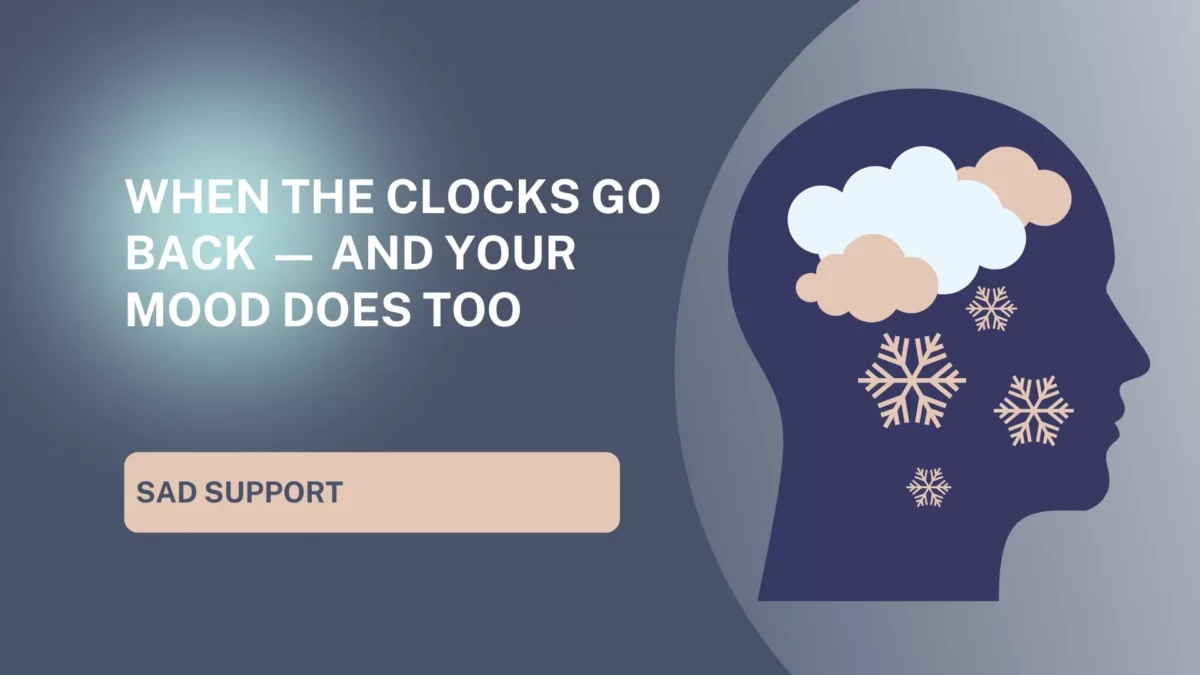Every year, it sneaks up on us. One weekend, the evenings are golden and drawn out; the next, darkness has arrived before most of us have even finished work. For many, the clocks going back brings a welcome excuse to curl up earlier, light a candle, and rest. For others, it feels like something more unsettling — as though the light has been switched off not just outside, but inside too.
If your energy dips, motivation fades, or you notice yourself becoming more tearful, irritable, or detached as autumn turns to winter, you’re not alone. This time of year can significantly affect mental health, especially for those prone to Seasonal Affective Disorder (SAD) or existing anxiety and depression. Let’s look at why this happens, what you can do to support yourself, and how counselling can help you move through it with more ease.
Why the Clock Change Affects Mood
Our bodies and minds are finely tuned to light. When daylight hours reduce, our internal body clocks (circadian rhythms) can fall out of sync with our daily lives. Less sunlight means lower serotonin — the neurotransmitter linked with mood, appetite, and sleep — and higher melatonin, which can leave us feeling sluggish and low. Add to that colder weather and social withdrawal, and it’s no wonder that many people feel their mental health shift as the season changes.
For some, this becomes a clear pattern every year. For others, it’s a subtle slide that goes unnoticed until energy levels crash or motivation disappears. The key is recognising it early, understanding that it’s not weakness or laziness — it’s your body and mind responding to real environmental change.
10 Reasons Why Your Mood May Drop When the Clocks Go Back
- Reduced exposure to natural daylight affects serotonin levels.
- A disrupted sleep-wake cycle makes mornings harder and energy lower.
- Melatonin increases in darkness, which can trigger tiredness and lethargy.
- Colder temperatures can limit outdoor activity, reducing exercise and fresh air.
- Isolation increases as people socialise less in darker months.
- Daily routines shift — often towards more screen time and less movement.
- Emotional eating patterns can reappear due to comfort-seeking.
- Lower vitamin D levels can impact both mood and immunity.
- Unresolved stress or depression becomes more noticeable without distraction.
- Cultural pressure to feel festive or cosy can contrast sharply with how you actually feel.
When you understand these triggers, you can begin to work with them — rather than against them.
10 Ways to Help When the Darkness Feels Heavy
- Get outside early. Even ten minutes of morning daylight helps regulate your body clock.
- Move your body daily. Gentle exercise such as walking, stretching, or yoga boosts serotonin and endorphins.
- Keep a consistent sleep schedule. Try to wake and sleep at similar times, even on weekends.
- Limit alcohol and sugar. Both can temporarily lift mood, then drop it sharply.
- Eat warm, nourishing foods. Include complex carbohydrates and omega-3 rich foods that support brain health.
- Try light therapy. A daylight lamp can be surprisingly effective if used regularly in the morning.
- Stay connected. Plan regular social contact, even if it’s online or brief. Isolation can intensify low mood.
- Reflect and plan small joys. Make a list of comforting, meaningful winter activities that help you feel grounded.
- Talk about how you feel. Sharing your experience can lift shame and remind you that you’re not alone.
- Seek professional support early. Counselling can help you understand and manage seasonal mood changes before they deepen.
How Counselling Can Help
When your mood dips with the seasons, it’s easy to assume that nothing will change until the light returns. But counselling offers a space to slow down and understand what’s really happening — both biologically and emotionally.
A counsellor can help you identify patterns between mood and time of year, explore any underlying stress, and build a personalised wellbeing plan that supports you through winter. Counselling isn’t just about “fixing” the sadness — it’s about learning how to meet yourself with compassion, especially when motivation feels low.
Approaches such as Cognitive Behavioural Therapy (CBT) can help you challenge negative thought patterns that become stronger in darker months. Mindfulness-based techniques can help you reconnect with small moments of light and presence. Acceptance and Commitment Therapy (ACT) can support you in aligning your actions with your values, even when your energy is low.
Many clients find that simply having space to talk through the emotional impact of winter, and to name what they’re feeling, brings enormous relief.
Advice from Hope Therapy & Counselling Services
If you’ve noticed your mood dip as the seasons change, you deserve support — and you don’t need to wait until it becomes unbearable. Hope Therapy & Counselling Services offers professional, compassionate counselling for both seasonal and year-round mental health challenges. Sessions are available online, by phone, or in person, making support easy to access wherever you are.
Our team specialises in helping you manage anxiety, depression, and the emotional effects of environmental change. You can book a free 15-minute consultation to explore your needs and find the right therapist for you: https://www.hopefulminds.co.uk/free-consultation-with-hope-therapy/
You’ll also find free mental health resources and expert videos on the Hopeful Minds YouTube Channel, created to support your wellbeing all year round.
FAQ
Why do I feel worse when the clocks go back?
Because daylight influences hormones and sleep rhythms, the sudden reduction in natural light can affect your mood, energy, and motivation. This is a biological response, not a personal failing.
What is Seasonal Affective Disorder (SAD)?
SAD is a type of depression linked to seasonal change, typically worsening in autumn and winter.

